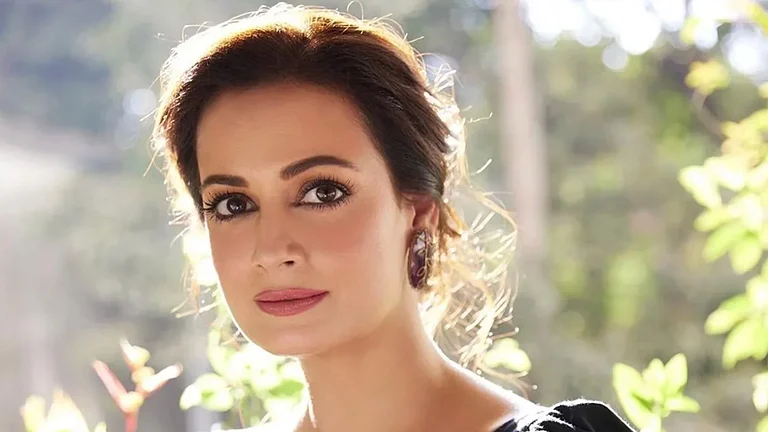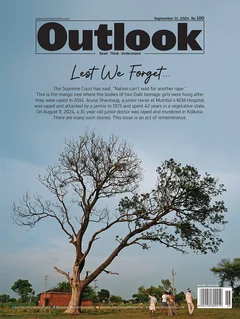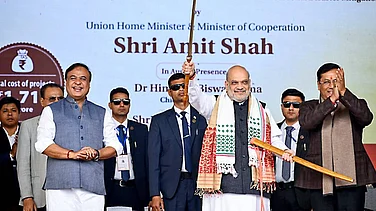This is the cover story for Outlook's 11 September 2024 magazine issue 'Lest We Forget'. To read more stories from the issue, click here
Prologue
It is around 1 am. Summer nights have never been colder than this for Gayatri*. Into the depths of the woods where no one can trace even the dead, she scampers for life. She can’t ask for help. She can’t rely on anyone. Occasionally, when she hears echoes of human voices, she escapes into the darker patches. The only light she can see comes from a nearby power plant. She is perhaps lost—lost because of unbearable pain and a directionless journey. With bruises all over the face, she staggers. The faraway light is again visible. “I remember these lights—they are visible from my village. I am going in the right direction,” she murmurs.
At the break of dawn, when faint sunlight enters the impenetrable forests, she reaches her nanihal. She sits for a while, sips water, hugs her mother and tells her that he punched and slapped her, and snatched her mobile. She, however, could not tell her that she was raped twice. There was a sense of shame and disgrace, coupled with the trauma of the threat—agar tu chup nahi rahegi, tujhe jaan se mar dunga.
Gayatri, 18, a resident of Singrauli district in Madhya Pradesh, received a call on April 20 at around 4 pm. The person on the other side said: “I teach at your college. Your hostel scholarship amount has been transferred to my account. If you meet me at the Tikri High School and sign some papers, I will transfer the amount to you.”
It was already evening and Tikri is around 40 km from her house. At first, Gayatri refused but after “madam” insisted, she took a bus and went to Tikri. Upon reaching and calling the same number, “madam” said that she would send her son to pick her up. Around 6 pm, her son came on a black bike, sporting a helmet and a pair of black gloves. He drove her into the woods. Frightened, she wanted to scream. But there was nobody to hear her cry.
He took her to a small mud house in the middle of nowhere, so impenetrable that even sunlight was elusive. One couldn’t get in without hunching and the first thing one noticed was ‘Sri Sita’ embossed on one of the walls; the word Ram had fallen. It was here that she was raped twice. He then took her to a secluded spot in the forest and told her to leave. Gayatri’s ordeal of reaching home started then.
She is not the only Adivasi girl who was allegedly raped following the same modus operandi by one Brijesh Prajapati, a resident of Nagoan Darshan Singh in Sidhi. As per police FIRs and Prajapati’s personal memorandum, he has confessed to raping at least four young girls since April 2024. However, the police only learned about it in May, when one of the survivors gathered courage and filed a police complaint. The locals believe there are several other unreported cases as most of the tribal women and their families prefer to keep quiet because of the fear of social stigma and also it could affect their ‘marriage prospects’.
Silence
Around 20 km from Sidhi city, as we entered Charki village, a sense of desolation hit us. According to police records, this is the village where the first survivor of the serial rapes that shook the state resides. However, the prevalent silence in the village made it obvious that the choice was made between whether “to forget” or “to conceal”. When asked if they were aware of the incident wherein five tribal girls were allegedly raped and if one of the girls hailed from this village, the villagers replied with a stern “no”.
“We haven’t heard of this incident. It might be from another village,” says Shivan Baiga, in his 40s. When we tell him the name of the survivor’s father, he says: “We Baigas have been living here together forever, but I have never heard this name.” Baigas fall under the Particularly Vulnerable Tribal Groups (PVTG) category and are considered one of the most backward Adivasis in the country.

Around 200 meters away from Shivan’s house, at the village secondary school, a local journalist explains the silence. “Don’t ask them about rape. Ask them about the house where a mobile phone was stolen, and a police complaint was lodged. They don’t want people to know. It impacts their social lives,” says Hariom Singh. After a long search, when we met the survivors’ parents, their grudge against the media, which made the case ‘public’, came to the fore. “Why are so many people coming from Bhopal and Delhi? It is just a case of a stolen mobile. The man called my daughter and told her that she would get Rs 10,000 as she had turned 18. The man, who called up disguised as a woman using some app, beat her up badly and snatched her mobile. The next day she came back and told us that she lost the mobile. Later, I got to know that the man used the mobile phone to call other women and had stolen their mobile phones as well,” says the survivor’s father.
A brutal rape case has turned into a ‘simple case’ of mobile robbery due to the fear of ‘social stigma’, says the police. Deepak Bhagel, the investigating officer and the station-in-charge of Majhauli police station, says: “This was technically the first case but was reported the last. When we traced the number from which the subsequent survivors received the calls, we found that the accused was using the number that was registered under the name of the first survivor’s mother (Charki village). When we investigated further, they said that her daughter lost the phone around mid-April. While checking the call records, we found that she had spoken to this one person for a long time before she lost the mobile phone. After we insisted, she told us the truth.”
The prevalent silence in the village made it obvious that the choice was made between whether “to forget” or “to conceal”.
According to the police reports, Kali* was at her paternal aunt’s house at Chouphal when she received a call from an unknown number and the person asked her to come to Tikri to sign the forms to get a scholarship. When she refused, citing the long distance, the person said that she would send her son to pick her up. While going to meet the “madam”, she also took her minor sister along. They were taken to a secluded mud house where he tied her sister and raped her. Later, he also raped her sister and dropped them at an isolated location where from they had to walk for miles to reach home the next morning. “We shared the incident with my aunt’s daughter-in-law but didn’t tell her about the rape,” the FIR reads.
Kali is now in Chouphal, and the family does not want to meet anyone. “The incident has scarred us. I am requesting you all not to bother us. We are tired,” says Kali’s mother while referring to the “big cars” that lined up outside their house after the incident came to light. On being asked whether they have received any special assistance from the government after the incident, Kali’s father says: “No”. Kali was not a college student, unlike the others. “There are no scholarships for Adivasi girls who turn 18. But since the government is launching new schemes for the PVTG communities, the girl thought she was actually getting a scholarship,” says a local villager. The cycle of silence could have endangered more girls had it not been for Rashi* who rushed to the police station and filed a complaint of rape and robbery.
A Helmet, Black Gloves & Black Bike
On May 13, at around midnight, after walking for more than three hours, Rashi reached Barseni, a village in Sidhi district. Gasping for breath and whimpering in pain, she sat near the wooden fence of a house and asked for water. The only resident of the house, an old lady in her 60s, came out. The bruises on her face were clearly visible. She gave her water and encouraged her to speak up. The 18-year-old, who is pursuing BA at a college in Sidhi, received a call from “Archana madam” who asked her to come to Majhauli to sign some documents for the yearly stipend that the Adivasi girl students receive from the college. When she reached the place, the man arrived.

Riding on a black bike, sporting a helmet and a pair of black gloves, he introduced himself as the son of “Archana madam”. He took her to the same hut and snatched her mobile. While he was hitting her and forcing himself on her, she went numb. “He must have thought that I had lost consciousness. He turned the mobile torch on and took off his helmet and gloves. It was then that I saw his face. His hands were burnt,” recalls Rashi.
The reference to the burnt hands and the fairly apt description of the man given by Rashi gave the police the first clue to identify him.
After spending the night at Barseni, Rashi called her family the next day and told them everything. “We rushed to pick her up as soon as we got her location,” says the police constable, who is also her relative. “Reportedly, it was the last case but the first FIR that was lodged which helped us untie the knots. When we tried tracing the location of the survivor’s mobile, we found it somewhere near Marwas. After examining the call records, we arrested him a few days later.”
The accused Brijesh Prajapati used to take the survivors to a secluded and abandoned mud house, 400 km from his in-law’s village named Akla. “My father used to stay here when he was alive. We have moved to a new house close by. We had no clue that this place was being used for committing such heinous crimes,” says Harilal, Prajapati’s father-in-law.
Last year, Prajapati met with an accident while he was working at a steel factory in Jabalpur. His hands and legs sustained burn injuries. “We brought him to our place and took care of him. We didn’t know that he would turn out to be such a monster. He used to spend most of the nights outside and told us that he was at his home. We believed him,” Harilal adds.
Prajapati has a daughter who is now five and is studying in the village primary school. Though the incident shattered his wife, she visited him a few times in jail. On Rakhsabandhan, when prisoners are allowed to meet their family members freely, she took her daughter along. Harilal says: “He asked her if we would be able to arrange the money if he manages to get bail. My daughter cried and asked me, but I said that we don’t have money even for basic survival, how would we arrange anything? He has three brothers who are working as labourers in different states. They should be able to help.” When asked if his daughter would like to continue with the marriage, he says: “It is solely her decision. You know, people forget and forgive men, no matter what they do. She has a little daughter. Where would she go if she snaps ties with him? Who will give her social recognition?”

Almost 40 km away, at Brijesh’s village, his father waits for his son’s bail. Standing near the fallen wall of Brijesh’s room that was bulldozed by the government as means of immediate punishment, Dadul Prajapati says: “None of my sons is like this. But as a father what can I do? I can only expect him to come back.” He went to meet his son in the jail where Brijesh hugged him and enquired about his chances of bail.
“I love my village. I grew up there. But it lacks many things. If we had streetlights, I could have perhaps found my way out that day.”
One of the neighbours mentioned that after the accident he started acting strange and became violent because people started teasing him. But the records show that he is a history-sheeter. His former wife left him as he used to fight with her, says Dadul. Two years ago, his current wife filed a police complaint at the Jamodi police station for abusing her. Later, they sorted it amicably and the case didn’t proceed further.
In his police memorandum, he has accepted raping the girls and snatching their mobiles. “I used a magic voice app to change my voice, and pretended to be a lady professor and would call these girls and tell them to come down to sign their scholarship/stipend forms,” the memorandum reads. He also said that he used to get these numbers from Luvkush Prajapati, one of his relatives. He took the help of Sandeep and Rahul—two other relatives—to execute the crime.
The police have made four arrests, including Prajapati and his three accomplices. A chargesheet has been filed in response to the four FIRs and they have slapped sections 376(2)(n) (sexual assault and rape), 342 (wrongful confinement), 294 (obscene acts), 323 (voluntarily causing hurt), 506 (criminal intimation), 363 (kidnapping), 366 (abduction), 394 (voluntarily causing hurt while committing or attempting to commit robbery), 120(b) (criminal conspiracy), and POCSO for raping the minor girl who accompanied Kali. “The DNA of one of the survivors matches with Prajapati,” says Bhagel. The black gloves, the helmet and the bike were recovered.
Indomitable Hopes
Notably, all five survivors belong to Adivasi communities. While three of them are Gond, the other two are Baigas. Local journalists who followed the case closely think that their vulnerabilities were used to trap them. “They almost have nothing except a few scholarships and stipends that the government offers. They would definitely pay heed to any call if there is any mention of any scholarships,” says Singh. The echoes of such vulnerabilities could be heard as one visits the houses of these survivors.
Around 80 km away from Sidhi city, as one reaches Gayatri’s village Bhadseda, one needs to leave the car or bike on the national highway. There are no motorable roads, and no effort has been put into implementing the Pradhan Mantri Gramin Sadak Yojana. When it rains, the road in the forest becomes so muddy that walking through the slush is almost impossible. “This is a death trap. If someone falls ill, we can’t take them to the hospital,” says Suraj Gond, a local. Only two-three houses have got the assistance through PM Awas Yojana and the rest of them are staying in mud houses in miserable conditions.
After walking for almost five km on those muddy roads, we reached Gayatri’s house. There was a small poster with PM Modi’s face on it with a slogan: ‘Madhya Pradesh mein Modi chahiye’. “They had put it during the Assembly elections. That was the last time any outsider came here,” says Gayatri’s brother. When we inquired about the state of electricity, he says: “On most days, the village into plunged in darkness.”
Despite growing up in this village, Gayatri managed to secure admission in a college in Sidhi for B.Sc. She stays staying there in a room with another senior. The rent is Rs 1,800 per month. “I didn’t get a room in the hostel as it is allocated on a first come first serve basis. But the government gives us Rs 15,000 per year for staying near college,” she says. The Madhya Pradesh government gives the Adivasi students special assistance through Aawas Bhatta Sahayata Yojana for accommodation if the hostel is unavailable. This was the scheme that Brijesh referred to when she called Gayatri.
The charming smile on her face is unmissable. “I love chemistry. I want to become a doctor. After graduation, I will try to be a medical professional—that is my dream.” A fan of Akshay Kumar, Gayatri recalls that it has been almost a year since she watched a film. “Sidhi doesn’t have a cinema hall,” she says. Three of her brothers have left studies. “But she continued as she is the brightest of the lot,” notes her father. That day, when the incident happened, her father asked her to call her maternal uncle but due to poor network, she couldn’t reach him. “Had he accompanied her, things would have turned out differently,” he says.
MORE FROM THIS ISSUE
A few km away from Bhadseda, at Jhara, stays Rashi. She is an art student and loves economics. “I want to be a teacher,” she says. An introvert, Rashi is aware that education will give her social mobility. While Rashi likes city life, Gayatri loves her village despite the infrastructural limitations. “I grew up there. I am attached to my village. But it lacks many things. If we had streetlights, I could have perhaps found my way out that day.” Suddenly, she turns silent. The road to ‘forgetting’ is not easy. The memory haunts her even in silence.
(*All the names of the survivors have been changed to keep their identities hidden, as per the SC guidelines)
(This appeared in the print as 'Unspeakable Memories')


































